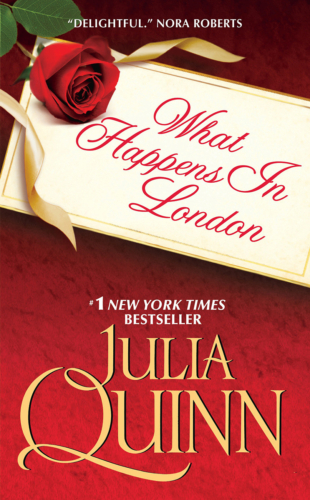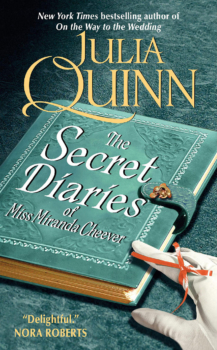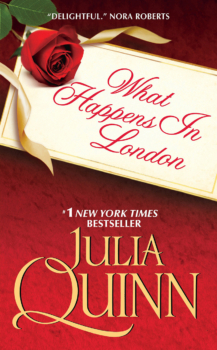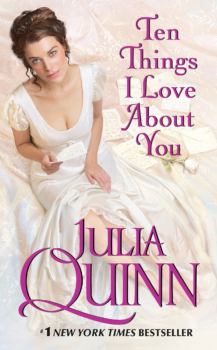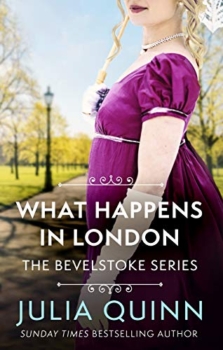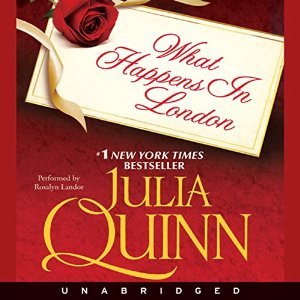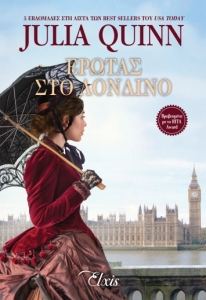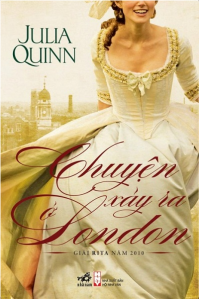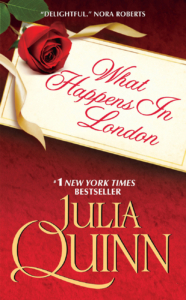What Happens in London
Book 2 in the
Bevelstoke Series
When Olivia Bevelstoke is told that her new neighbor may have killed his fiancée, she doesn’t believe it for a second, but still, how can she help spying on him, just to be sure? So she stakes out a spot near her bedroom window, cleverly concealed by curtains, watches, and waits… and discovers a most intriguing man, who is definitely up to something.
Sir Harry Valentine works for the boring branch of the War Office, translating documents vital to national security. He’s not a spy, but he’s had all the training, and when a gorgeous blonde begins to watch him from her window, he is instantly suspicious. But just when he decides that she’s nothing more than a nosy debutante, he discovers that she might be engaged to a foreign prince, who might be plotting against England. And when Harry is roped into spying on Olivia, he discovers that he might be falling for her himself…
The second book in the Bevelstoke series: witty, irresistibly romantic and by the bestselling author of the global phenomenon Bridgerton.
 Start Reading Now
Start Reading Now
 Explore Inside this Story
Explore Inside this Story

Books in this series:
Find out more about the Bevelstoke Series →
-
JQ's video for What Happens in London was featured on The Huffington Post. After watching, you can read the interview about the making of the video.
-
Quinn-tessential Quote
"I have a secret, Lady Olivia," he whispered, leaning down just as far as he could without breaking the bounds of propriety. "I don't like you either."
-
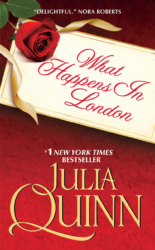
Inside the Story:
JQ’s Author Notes- Although What Happens in London is a companion book to The Secret Diaries of Miss Miranda Cheever, TSDOMMC’s hero and heroine don’t make an appearance. I had originally intended them to, but they didn’t end up fitting in the plot.
- I'm not so sure I would have made my prince Russian if I'd realized how difficult the language is to translate. Because Russian uses the Cyrillic alphabet, it needs to be both translated and transliterated. I worked with five different Russian speakers to help me translate the text, and they never agreed on the best way to do it. In the interest of consistency, I ended up going with the translations as done by my copyeditor, whom I'm told has a Masters in Russian literature.
- Miss Butterworth and the Mad Baron first appeared in It's in His Kiss as one of the books Hyacinth was reading to Lady Danbury. I had no plans to use it again, but when I needed Harry to give Olivia an unusual gift, it just popped into my mind. I LOVED writing the passages in this book. It is seriously fun to write bad literature. So much fun, in fact, that my sister Violet Charles and I turned it into a graphic novel!
- In regency times, the wealthy had their butlers iron their newspapers before they read them. This was not to eliminate wrinkles but rather to seal the ink so that it did not rub off on people’s hands.
- “Hell’s Vengeance Boileth in Mine Heart” is the most famous aria from Mozart’s The Magic Flute, and is more commonly referred to as the Queen of the Night’s Aria. It is known for its difficulty, reaching a high F6, which is rare in opera.

Bonus Features
Enjoy an Excerpt
from
What Happens in London
Prologue
By the age of twelve, Harry Valentine possessed two bits of knowledge that made him rather unlike other boys of his class in England of the early nineteenth century.
The first was his complete and absolute fluency in the languages of Russian and French. There was little mystery surrounding this talent; his grandmother, the extremely aristocratic and opinionated Olga Petrova Obolenskiy Dell, had come to reside with the Valentine family four months after Harry’s birth.
Olga loathed the English language. In her (frequently expressed) judgment, there was nothing in this world that needed to be said that could not be expressed in Russian or French.
As to why she had gone and married an Englishman, she never could quite explain.
“Probably because it needs explaining in English,” Harry’s sister Anne had muttered.
Harry just shrugged and smiled (as any proper brother would) when this got her ears boxed. Grandmère might disdain English, but she could understand it perfectly, and her ears were sharper than a hound’s. Muttering anything –in any language– was a bad idea when she was in the schoolroom. Doing so in English was incredibly foolish. Doing so in English whilst suggesting that French or Russian was not adequate for the verbal task at hand…
In all honesty, Harry was surprised Anne hadn’t been paddled.
But Anne loathed Russian with the same intensity Grandmère reserved for English. It was too much work, she complained, and French was almost as difficult. Anne had been five when Grandmère had arrived, and her English was far too entrenched for anything else to gain an equal footing.
Harry, on the other hand, was happy to speak in whichever language was spoken to him. English was for everyday, French was elegance, and Russian became the language of drama and excitement. Russia was big. It was cold. And above all, it was great.
Peter the Great, Catherine the Great–Harry had been weaned on their stories.
“Bah!” Olga had scoffed, more than once, when Harry’s tutor had attempted to teach him English history. “Who is this Ethelred the Unready? The Unready? What kind of country allows their rulers to be unready?”
“Queen Elizabeth was great,” Harry pointed out (in French, since it was the only language all three of them could understand.)
Olga was unimpressed. “Do they call her Elizabeth the Great? Or the Great Queen? No, they do not. They call her the Virgin Queen, as if that is anything to be proud of.”
It was at this point that the tutor’s ears grew very red, which Harry found quite curious.
“She,” Olga continued, with all possible ice, “was not a great queen. She didn’t even give her country a proper heir to the throne.”
“Most scholars of history agree that it was wise for the queen to avoid marriage,” the tutor attempted to say, in his almost, but not quite fluent, French. “She needed to give the appearance of being without influence, and…”
His voice trailed off. Harry was not surprised. Grandmère had turned to him with one of her razor sharp, rather eaglish stares. Harry did not know anyone who could continue speaking through one of those.
“You are a stupid little man,” she pronounced, then turned her back on him entirely. She fired him the next day, then taught Harry herself until they were able to find a tutor whose French was as perfect as her own.
It wasn’t precisely Olga’s place to hire and fire educators for the Valentine children, who by then numbered three. (Little Edward had been added to the nursery when Harry was seven.) But no one else was likely to involve themselves in the matter. Harry’s mother, Katarina Dell Valentine, never argued with her mother, and as for his father… well…
That had rather a lot to do with the second bit of uncommon knowledge tumbling ’round Harry Valentine’s twelve-year-old brain.
Harry’s father, Sir Lionel Valentine, was a drunk.
This was not the uncommon knowledge. Everyone knew that Sir Lionel drank more than he ought. There was no hiding it. Sir Lionel stumbled and tripped (on his words and his feet), he laughed when no one else did, and, unfortunately for the two housemaids (and the two carpets in Sir Lionel’s study), there was a reason the alcohol had not caused his body to grow fat.
And so Harry became proficient in the task of cleaning up vomit.
It started when he was ten. He probably would have left the mess where it lay, except that he had been trying to ask his father for a bit of pocket money, and he’d made the mistake of doing so too late in the evening. Sir Lionel had already partaken of his afternoon brandy, his early evening nip, his wine with supper, his port immediately following, and was now back to his favorite, the aforementioned brandy, smuggled in from France. Harry was quite certain that he had spoken in complete (English) sentences when he made his request for funds, but his father just stared at him, blinking several times as if he couldn’t quite comprehend what his son was talking about, and then promptly threw up on Harry’s shoes.
So Harry really couldn’t avoid the mess.
After that there seemed to be no going back. It happened again a week later, although not directly on his feet, and then a month after that. By the time Harry was twelve, any other young child would have lost count of the number of times he’d cleaned up after his father, but he had always been a precise sort of boy, and once he’d begun his accounting, it was difficult to stop.
Most people would have probably lost count around seven. This was, Harry knew from his extensive reading on logic and arithmetic, the largest number that most people could visually appreciate. Put seven dots on a page, and most people can take a quick glance and declare, “Seven.” Switch to eight, and the majority of humanity was lost.
Harry could do up to twenty-one.
So it was no surprise, that after fifteen cleanings, Harry knew exactly how many times he’d found his father stumbling through the hall, or passed out on the floor, or aiming (badly) at a chamber pot. And then, once he’d reached twenty, the issue became somewhat academic, and he had to keep track.
It had to be academic. If it wasn’t academic, then it would be something else, and he might find himself crying himself to sleep instead of merely staring at the ceiling as he said, “Forty-six, but with a radius quite a bit smaller than last Tuesday. Probably didn’t have much for supper tonight.”
Harry’s mother had long since decided to ignore the situation entirely, and she could most often be found in her gardens, tending to the exotic rose varieties her mother had brought over from Russia so many years earlier. Anne had informed him that she planned to marry and “be gone from this hellhole” the moment she turned seventeen. Which, incidentally, she did, a testament to her determination, since neither of her parents had made any effort by that point to secure her a match. As for Edward, the youngest–he learned to adapt, as Harry had. Father was useless after four in the afternoon, even if he seemed lucid (which he generally did, up ’til suppertime, when the wheels came off entirely.)
The servants all knew as well. Not that their numbers were legion; the Valentines did well enough with their tidy home in Sussex and hundred per year they continued to receive as a part of Katarina’s dowry. But this did not translate to splendid wealth, and the Valentines’ staff numbered but eight–butler, cook, housekeeper, stable boy, two footmen, maid, and scullery girl. Most chose to stay with the family despite the occasional unpleasant, alcohol-related duties. Sir Lionel might be a drunk, but he was not a mean drunk. Nor was he stingy, and even the maids learned to deal with his messes if it meant an extra coin here and there when he remembered enough of his activities to be embarrassed by them.
So Harry wasn’t really sure why he kept cleaning up after his father, since he certainly could have left it to someone else. Maybe he didn’t want the servants to know how often it happened. Maybe he needed a visceral reminder of the perils of alcohol. He’d heard that his father’s father had been the same way. Did such things run in families?
He did not want to find out.
And then, quite suddenly, Grandmère died. Nothing so peaceful as in her sleep–Olga Petrova Obolenskiy Dell would never depart this earth with so little drama. She was sitting at the dining room table, about to dip her spoon in soup, when she clutched her chest, made several gasping noises, and collapsed. It was later remarked that she must have had some level of consciousness before she hit the table, because her face missed the soup entirely, and she somehow managed to hit the spoon, sending a dollop of the scalding liquid flying through the air toward Sir Lionel, whose reflexes were far too dulled to duck.
Harry did not witness this firsthand; at twelve, he was not permitted to dine with the adults. But Anne saw the whole thing, and recounted it breathlessly to Harry.
“And then he ripped off his cravat!”
“At the table?”
“At the table! And you could see the burn!” Anne held up her hand, her thumb and forefinger pinching out a distance of about an inch. “This big!”
“And Grandmère?”
Anne sobered a bit. But only a bit. “I think she’s dead.”
Harry swallowed and nodded. “She was very old.”
“At least ninety.”
“I don’t think she was ninety.”
“She looked ninety,” Anne muttered.
Harry said nothing. He wasn’t sure what a ninety-year-old woman looked like, but Grandmère certainly had more wrinkles than anyone else of his acquaintance.
“But I’ll tell you the strangest part,” Anne said. She leaned forward. “Mother.”
Harry blinked. “What did she do?”
“Nothing. Not a thing.”
“Was she seated near to Grandmère?”
“No, that’s not what I mean. She was across and diagonal– too far away to be helpful.”
“Then–”
“She just sat there,” Anne cut in. “She did not move. Did not even start to rise.”
Harry considered this. It was, sad to say, not surprising.
“Her face did not even move. She just sat there like this.” Anne’s face assumed a decidedly blank expression, and Harry had to admit, it was precisely like their mother.
“I shall tell you something,” Anne said. “If she were to collapse in her soup in front of me, I would at the very least look surprised.” She shook her head. “They are ridiculous, the both of them. Father does nothing but drink, and Mother does nothing at all. I tell you, I cannot wait until my birthday. I don’t care if we’re supposed to be in mourning. I’m marrying William Forbush, and there is nothing either one of them can do about it.”
“I don’t think you have to worry about that,” Harry said. Mother would likely possess no opinion on the matter, and Father would be too drunk to notice.
“Hmmph. You’re probably right.” Anne’s mouth pressed together into a rueful frown, and then, in an uncharacteristic show of sibling affection, she reached out and gave his shoulder a squeeze. “You’ll be gone soon, too. Don’t worry.”
Harry nodded. He was due to leave for school in a few short weeks. And while he felt a little guilty that he got to leave while Anne and Edward had to remain behind, this was more than drowned out by the overwhelming sense of relief that washed over him the first time he rode off to school.
It was good to be gone. With all due respect to Grandmère and her favorite monarchs, it might even have been great.
Harry’s life as a student proved just as rewarding as he’d hoped. He attended Hesslewhite, a reasonably rigorous academy for boys whose families lacked the clout (or, in Harry’s case, the interest) to send their sons to Eton or Harrow.
Harry loved school. Loved it. He loved his classes, he loved sport, and he loved that when he went to bed, he did not have to detour to every corner of the building, doing his late evening check for his father, fingers crossed that he’d passed out before making a mess of himself. At school Harry took a straight journey from the common room to his dormitory, and he loved every uneventful step of the way.
But all good things must draw to a close, and at the age of nineteen, Harry was graduated with the rest of his class, including Sebastian Grey, his first cousin and closest friend. There was a ceremony, as most of the boys wished to celebrate the occasion, but Harry “forgot” to tell his family about it.
“Where is your mother?” his aunt Anna asked him. Like Harry’s mother, her voice betrayed no trace of an accent, despite the fact Olga had insisted upon speaking to them only in Russian when they were small. Anna had married better than Katarina, having wed the second son of an earl. This had not caused a rift between the sisters; after all, Sir Lionel was a baronet, which meant that Katarina was the one called “her ladyship.” But Anna had the connections and the money, and perhaps more importantly, she had –until his death two years prior– a husband who rarely indulged in more than one glass of wine at supper.
And so when Harry mumbled something about his mother being a bit overtired, Anna knew exactly what he meant–that if his mother came, his father would follow. And after Sir Lionel’s spectacular display of stumbling grandiosity at Hesslewhite’s convocation of 1807, Harry was loathe to invite his father to another school function.
Sir Lionel tended lose his S’s when he drank, and Harry was not certain he could survive another “Thplendid, thplendid thchool” speech, especially as it had been delivered whilst standing on a chair.
During a moment of silence.
Harry had tried to pull his father down, and he would have been successful had his mother, who was seated on Sir Lionel’s other side, aided in the endeavor. She, however, was staring straight ahead, as she always did at such times, pretending she heard nothing. Which meant that Harry had to give his father a lopsided yank, setting him rather off-balance. Sir Lionel came down with a whoop and a crash, striking his cheek on the back of the chair in front of Harry.
This might have set another man into a temper, but not Sir Lionel. He gave a stupid smile, called Harry a “thplendid thon,” and then spit out a tooth.
Harry still had that tooth. And he never allowed his father to set foot on the school’s campus again. Even if it meant he was the only boy without a parent in attendance at the graduation ceremony.
His aunt insisted upon seeing him home, for which Harry was grateful. He did not like having guests, but Aunt Anna and Sebastian already knew all there was to know about his father–well, most of it. Harry hadn’t shared the bit about the 126 times he’d mopped up after him. Or the recent loss of Grandmère’s prized samovar, whose enamel cracked right off its silver core when Sir Lionel had tripped over a chair, done a curiously graceful leap through the air (presumably to catch his balance), then landed on his belly atop the sideboard.
Three plates of eggs and a rasher of bacon had also been lost that morning.
On the bright side, the hounds had never been so well-fed.
Hesslewhite had been chosen because of its proximity to the Valentine home, and so after only ninety minutes in the carriage, they turned onto the drive and began the last short stretch.
“The trees are certainly well leafed this year,” Aunt Anna remarked. “Your mother’s roses are doing well, I trust.”
Harry nodded absently, trying to gauge the time. Was it still late afternoon, or had the day made its way into early evening? If it was the latter, he’d have to invite them in for supper. He’d have to invite them in in any case; Aunt Anna would want to say hello to her sister. But if it was late afternoon, they’d expect only tea, which would mean they could be in and out without a glimpse of his father.
Supper was a different story. Sir Lionel always insisted upon dressing for supper. It was, he liked to say, the mark of a gentleman. And no matter how small their dinner party (just Sir Lionel, Lady Katarina, and whichever of their children were in residence, ninety-nine percent of the time), he liked to play the host. Which generally meant quite a lot of storytelling and bon-mots, except that Sir Lionel tended to forget the middle bits of the stories, and his “mots” weren’t terribly “bon.”
Which in turn meant quite a lot of pained silence on the part of his family, who spent most of the supper pretending they didn’t notice when the gravy boat was knocked over, or when Sir Lionel’s wineglass was refilled.
Again.
And again.
And then, of course, again.
No one ever told him to stop. What was the point? Sir Lionel knew he drank too much. Harry had lost track of the number of times his father had turned to him and sobbed, “I’m thorry, I’m tho tho thorry. Don’t mean to be a trouble. You’re a good boy, Harry.”
But it never made a difference. Whatever it was that drove Sir Lionel to drink, it was far more powerful than any guilt or regret he might muster to stop it. Sir Lionel was not in denial about the extent of his affliction. He was, however, completely powerless to do anything about it.
As was Harry. Short of tying his father to his bed, which he was not prepared to do. So instead he never invited friends home, he avoided being in the house at suppertime, and, now that school was done, he counted the days until he could depart for university.
But first he had to make it through the summer. He hopped down from the carriage when they came to a stop in the front drive, then held up his hand to aid his aunt. Sebastian followed, and together the three of them made their way to the drawing room, where Lady Katarina was pecking at her needlepoint.
“Anna!” she said, looking as if she might rise to her feet (but not quite doing so). “What a lovely surprise!”
Anna leaned down to embrace her, then took a seat opposite. “I thought I would give Harry a ride home from school.”
“Oh, is the term finished, then?” Katarina murmured.
Harry gave a tight smile. He supposed he deserved the blame for her ignorance, as he had neglected to tell her that school was done, but really, shouldn’t a mother keep up on such details?
“Sebastian,” Katarina said, turning to her nephew. “You’ve grown.”
“It happens,” Sebastian quipped, flashing her his usual lopsided grin.
“Goodness,” she said with smile, “you’ll be a danger to the ladies soon.”
Harry very nearly rolled his eyes. Sebastian had already made conquests of nearly every girl in the village near Hesslewhite. He must give off some sort of scent, because the females positively fell at his feet.
It would have been appalling, except that the girls couldn’t all dance with Sebastian. And Harry was more than happy to be the nearest man standing when the smoke cleared.
“There won’t be time for that,” Anna said briskly. “I have purchased a commission for him. He departs in a month.”
“You shall be in the army?” Katarina said, turning to her nephew with surprise. “How grand.”
Sebastian shrugged.
“Surely you knew, Mother,” Harry said. Sebastian’s future had been decided several months earlier. Aunt Anna had been fretting that he needed a male influence ever since his father had died. And since Sebastian wasn’t likely to come into a title or a fortune, it was understood that he’d have to make his own way in the world.
No one, not even Sebastian’s mother, who thought the sun rose and set on her boy, had even suggested he consider the clergy.
Sebastian wasn’t overly excited about the prospect of spending the next decade or so fighting Napoleon, but as he’d said to Harry–what else could he do? His uncle, the Earl of Newbury, detested him and had made it clear that Sebastian could expect no perks, monetary or otherwise, from that connection.
“Maybe he’ll die,” Harry had suggested, with all the sensitivity and tact of a nineteen-year-old boy.
But then again, it was difficult to offend Sebastian, especially when it concerned his uncle. Or his uncle’s only son, the heir to Newbury. “My cousin’s even worse,” Sebastian replied. “Tried to give me the cut direct in London.”
Harry felt his brows rise with shock. It was one thing to abhor a family member; it was quite another to attempt public humiliation. “What did you do?”
Sebastian’s lips curled into a slow smile. “Seduced the girl he wanted to marry.”
Harry gave him a look that said he did not believe him for a second.
“Oh, very well,” Sebastian relented, “but I did seduce the girl at the pub he had his eye on.”
“And the girl he wants to marry?”
“Doesn’t want to marry him any longer!” Sebastian chortled.
“Good Lord, Seb, what did you do?”
“Oh, nothing permanent. Even I’m not foolish enough to tamper with the daughter of an earl. I just… turned her head, that’s all.”
But as his mother had pointed out, Sebastian wouldn’t have much opportunity for any sort of amorous efforts, not with a life in the army awaiting him. Harry had tried not to think about his departure; Seb was the only person in the world he trusted, completely and absolutely.
He was the only person who had never let Harry down.
It all made sense, really. Sebastian wasn’t stupid; quite the opposite, actually, but he wasn’t suited to academic life. The army was a much better choice for him. But still, as Harry sat there in the drawing room, uncomfortable in the too-small Egyptian chair, he couldn’t help but feel a bit sorry for himself. And selfish. He’d rather Sebastian went to university with him, even if it wasn’t the best thing for Sebastian.
“What color shall your uniform be?” Katarina asked.
“Dark blue, I should think,” Sebastian answered politely.
“Oh, you shall look smashing in blue. Don’t you think so, Anna?”
Anna nodded, and Katarina added, “As would you, Harry. Perhaps we should buy you a commission as well.”
Harry blinked in surprise. The army had never been discussed as a part of his future. He was the eldest, due to inherit the house, the baronetcy, and whatever monies his father didn’t drink before his death. He was not supposed to be put in harm’s way.
And besides that, he was one of the few boys at Hesslewhite who actually liked studying. He’d been dubbed “the professor” and hadn’t minded. What was his mother thinking? Did she even know him? Was she suggesting he join the army to improve his sense of fashion?
“Eh, Harry couldn’t be a soldier,” Sebastian said wickedly. “He can’t hit a target at close range.”
“That is not true,” Harry shot back. “I’m not as good as him,” he said with a jerk of his head toward Seb, “but I’m better than everyone else.”
“Are you a good shot, then, Sebastian?” Katarina asked.
“The best.”
“He’s also exceptionally modest,” Harry muttered. But it was true. Sebastian was a freakishly outstanding shot, and the army would be thrilled to have him, so long as they managed to keep him from seducing the whole of Portugal.
The half of Portugal, that was. The female half.
“Why don’t you take a commission?” Katarina asked.
Harry turned to his mother, trying to read her face, trying to read her. She was always so maddeningly blank, as if the years had slowly washed away everything that had given her character, that had allowed her to feel. She had no opinions, his mother. She let life swirl around her, and she sat through it all, seemingly uninterested in any of it.
“I think you would like the army,” she said quietly, and he thought–Had she ever made such a pronouncement? Had she ever offered an opinion as to his future, his well-being?
Had she only been waiting for the right time?
She smiled the way she always did–with a tiny sigh, as if the effort was almost too much. “You would look splendid in red.” And then she turned back to Anna. “Don’t you think?”
Harry opened his mouth, to say– Well, to say something. As soon as he figured out what. He had not planned on the army. He was to go to university. He’d earned a spot at Pembroke College, in Oxford. He thought he might study Russian. He’d not used the language much since Grandmère had died. His mother spoke it, but they rarely had complete conversations in English, much less Russian.
Damn, but Harry missed his grandmother. She wasn’t always right, and she wasn’t even always nice, but she was entertaining. And she’d loved him.
What would she have wanted him to do? Harry wasn’t sure. She would certainly have approved of Harry going to university if it meant that he would spend his days immersed in Russian literature. But she’d also held the military in extremely high regard and had openly mocked Harry’s father for never serving his country.
Of course, she had openly mocked Harry’s father for any number of things.
“You should consider it, Harry,” Anna pronounced. “I am certain Sebastian would be grateful for your company.”
Harry shot a desperate look at Sebastian. Surely he would understand Harry’s distress. What were they thinking? That he might wish to make such a decision over tea? That he might bite into his biscuit, consider the matter for a brief moment and decide that yes, dark blue was a splendid color for a uniform.
But Sebastian just did that tiny one-shoulder shrug of his, the one that said: What can I say? The world is a foolish place.
Harry’s mother lifted her teacup to her lips, but if she took a sip, it was undetectable by the tilt of the china. And then, as her cup descended toward its saucer, she closed her eyes.
It was just a blink, really, just a slightly longer than normal blink, but Harry knew what it meant. She heard footsteps. His father’s footsteps. She always heard him before anyone else. Maybe it was the years of practice, of living in the same house, if not precisely in the same world. Her ability to pretend that her life was something other than it was had been developed right alongside her ability to anticipate her husband’s whereabouts at all possible moments.
It was far easier to ignore what one did not actually see.
“Anna!” Sir Lionel exclaimed, appearing in, and then leaning against, the doorway. “And Sebastian. What a fine surprise. How’re you doing, m’boy?”
“Very well, sir,” Sebastian replied.
Harry watched his father enter the room. It was hard to tell just yet how far along he was. His gait was not unsteady, but there was a certain swing to his arms that Harry did not like.
“S’good to see you, Harry,” Sir Lionel said, giving his son a brief tap on the arm before making his way to the credenza. “School’s done, then?”
“Yes, sir,” Harry said.
Sir Lionel splashed something into a glass –Harry was too far away to determine precisely what– then turned to Sebastian with a sloppy grin. “How old r’you, now, Sebastian?” he asked.
“Nineteen, sir.”
The same as Harry. They were only a month apart. He was always the same as Harry.
“Are you serving him tea, Katy?” Sir Lionel said to his wife. “What are you thinking? He’s a man now.”
“The tea is quite adequate, Father,” Harry said sharply.
Sir Lionel turned to him with a blink of surprise, almost as if he’d forgotten he was there. “Harry, m’boy. It’s good to see you.”
Harry’s lips tightened, then pressed together. “It is good to see you, too, Father.”
Sir Lionel took a hearty swallow of his drink. “Is the term finished, then?”
Harry gave nod, along with his customary, “Yes, sir.”
Sir Lionel frowned, then drank again. “You’re done, though. Aren’t you? I received a notice from Pembroke College about your matriculation.” He frowned again, then blinked a few times, then shrugged. “Didn’t realize you’d applied.” And then, as an afterthought: “Well done.”
“I’m not going.”
The words emerged from Harry’s mouth in a quick tumble of surprise. What was he saying? Of course he was going to Pembroke College. It was what he’d wanted. What he’d always wanted. He liked studying. He liked books. He liked numbers. He liked sitting in a library, even when the sun was shining and Sebastian was yanking him out for rugby. (Sebastian always won this battle; there was little enough sun in the south of England, and one really did have to get out when one could. Not to mention that Sebastian was fiendishly persuasive, about all things.)
There could not be a boy in England better suited for life at university. And yet–
“I’m joining the army.”
Again the words came forth, no conscious thought involved. Harry wondered what he was saying. He wondered why he was saying it.
“With Sebastian?” Aunt Anna asked.
Harry nodded. “Someone’s got to make sure he doesn’t get himself killed.”
Sebastian gave him a dry look at the insult, but he was clearly too pleased by the turn of events to make a retort. He’d always been ambivalent about a future in the military; Harry knew that for all his bravado, he’d be relieved to have his cousin along with him.
“You can’t go to war,” Sir Lionel said. “You are my heir.”
Everyone in the room –all four of them his relations– turned to the baronet with varying degrees of surprise. It was, quite possibly, the only sensible thing he’d said in years.
“You have Edward,” Harry said bluntly.
Sir Lionel drank, blinked, and shrugged. “Well, that’s true.”
It was more or less what Harry would have expected him to say, and yet deep in his belly he felt a nagging pit of disappointment. And resentment.
And hurt.
“A toast to Harry!” Sir Lionel said jovially, lifting his glass. He did not seem to notice that no one else was joining him. “Godspeed, m’son.” He tipped back his glass, only then realizing that he had not recently refilled. “Well, damn it,” he muttered. “That’s awkward.”
Harry felt himself slumping in his chair. And at the same time, his feet began to feel itchy, as if they were ready move forward. To run.
“When do you leave?” Sir Lionel asked, happily replenished.
Harry looked at Sebastian, who immediately spoke up. “I must report next week.”
“Then it shall be the same for me,” Harry said to his father. “I shall need the funds for the commission, of course.”
“Of course,” Sir Lionel said, responding instinctively to the tone of command in Harry’s voice. “Well.” He looked down at his feet, then over at his wife.
She was staring out the window.
“Jolly fine to see you all,” Sir Lionel said. He plunked down his glass and ambled over to the door, losing his footing only once.
Harry watched him depart, feeling strangely detached from the scene. He’d imagined this before, of course. Not the going into the army, but the leaving. He’d always supposed that he’d head off to university in the usual fashion, packing his things into the family carriage and rolling away. But his imagination had indulged in all sorts of dramatic exits–everything from wild gesticulations to ice cold stares. His favorites involved flinging bottles against the wall. The expensive ones. The ones smuggled in from France. Would his father still support the Frogs with his illegal purchases, now that his son was facing them down on the battlefield?
Harry stared at the empty doorway. It didn’t matter, did it? He was done here.
He was done. With this place, with this family, with all those nights steering his father into bed, placing him carefully on his side so that if he did vomit again, at least he wouldn’t choke on it.
He was done.
Done.
But it felt so hollow, so quiet. His departure was marked by… nothing.
And it would take him years to realize that he’d been cheated.
Chapter One
“They say he killed his first wife.”
It was enough to make Lady Olivia Bevelstoke cease stirring her tea. “Who?” she asked, since the truth was, she hadn’t been listening.
“Sir Harry Valentine. Your new neighbor.”
Olivia took a hard look at Anne Buxton, and then at Mary Cadogan, who was nodding her head in agreement. “You must be joking,” she said, although she knew quite well that Anne would never joke about something like that. Gossip was her lifeblood.
“No, he really is your new neighbor,” put in Philomena Waincliff.
Olivia took a sip of her tea, mostly so that she would have time to keep her face free of its desired expression, which was a cross between unabashed exasperation and disbelief. “I meant that she must be joking that he killed someone,” she said, with more patience than she was generally given credit for.
“Oh.” Philomena picked up a biscuit. “Sorry.”
“I know I heard that he killed his fiancée,” Anne insisted.
“If he killed someone, he’d be in gaol,” Olivia pointed out.
“Not if they couldn’t prove it.”
Olivia glanced slightly toward her left, where, through a thick stone wall, ten feet of fresh springtime air, and another thick wall, this one of brick, Sir Harry Valentine’s newly leased home sat directly to the south of hers.
The other three girls followed her direction, which made Olivia feel quite foolish, as now they were all staring at a perfectly blank spot on the drawing room wall. “He didn’t kill anyone,” she said firmly.
“How do you know?” Anne responded.
Mary nodded.
“Because he didn’t,” Olivia said. “He wouldn’t be living one house away from me in Mayfair if he’d killed someone.”
“Not if they couldn’t prove it,” Anne said again.
Mary nodded.
Philomena ate another biscuit.
Olivia managed an ever-so-slight turn of her lips. Upward, she hoped. It wouldn’t do to frown. It was four in the afternoon. The other girls had been visiting for an hour, chatting about this and that, gossiping (of course), and discussing their wardrobe selections for the next three social events. They met like this frequently, about once per week, and Olivia enjoyed their company, even if the conversation lacked the heft she enjoyed with her closest friend Miranda née Cheever now Bevelstoke.
Yes, Miranda had gone and married Olivia’s brother. Which was a good thing. A marvelous thing. They had been friends since birth, and now they would be sisters until death. But it also meant that Miranda was no longer an unmarried lady, required to do unmarried lady sorts of things.
Unmarried Lady Sorts of Things
By Lady Olivia Bevelstoke, Unmarried LadyWear pastel colors (and be quite glad if you possess the correct complexion for such hues).
Smile and keep your opinions to yourself (with whatever success you are able).
Do what your parents tell you to do.
Accept the consequences when you don’t.
Find a husband who won’t bother to tell you what to do.
It was not uncommon for Olivia to formulate such epigraphic oddities in her mind. Which might explain why she so frequently caught herself not listening when she ought.
And, perhaps, why she might have, once or twice, said things she really should have kept to herself. Although in all fairness, it had been two years since she’d called Sir Robert Kent an overgrown stoat, and frankly, that had been far more charitable than the other items on her mental accounting.
But digressions aside, Miranda now got to do married lady sorts of things, which Olivia would have liked to have formed a list for, except that no one (not even Miranda, and Olivia still had not forgiven her for this) would tell her what it was that married ladies did, aside from not having to wear pastel colors, not having to be accompanied by a chaperone at all times, and producing small infants at reasonable intervals.
Olivia was quite certain there was more to the last bit. That was the one that sent her mother fleeing from the room every time she asked.
But back to Miranda. She had produced a small infant –Olivia’s darling niece Caroline, for whom she’d happily throw herself under hooves, equine or otherwise– and was now on her way to producing another, which meant that she was not available for regular afternoon chitchat. And as Olivia liked chitchat —and fashion and gossip– she found herself spending more and more time with Anne, Mary, and Philomena. And while they were often entertaining, and never malicious, they were, slightly-more-than-occasionally, foolish.
Like right now.
“Who are they, anyway?” Olivia asked.
“They?” Anne echoed.
“They. The people who say my new neighbor killed his fiancée.”
Anne paused. She looked at Mary. “Do you recall?”
Mary shook her head. “I don’t, actually. Sarah Forsythe, perhaps?”
“No,” Philomena put in, shaking her head with great certitude. “It wasn’t Sarah. She only got back from Bath two days ago. Libby Lockwood?”
“Not Libby,” Anne said. “I would have remembered if it were Libby.”
“That’s my point,” Olivia interjected. “You don’t know who said it. None of us do.”
“Well, I didn’t make it up,” Anne said, a touch defensively.
“I didn’t say you did. I would never think that of you.” It was true. Anne repeated most anything uttered in her presence, but she never made things up. Olivia paused, collecting her thoughts. “Don’t you think it’s the sort of rumor one might want to verify?”
This was met with three blank stares.
Olivia tried a different tactic. “If only for your own personal safety. If such a thing were true–”
“Then you think it is?” Anne asked, in a rather pinning-you-down sort of voice.
“No.” Good heavens. “I don’t. But if it were, then surely he would not be someone with whom we would wish to associate.”
This was met with a long beat of silence, finally broken by Philomena: “My mother has already told me to avoid him.”
“Which is why,” Olivia continued, feeling a bit as if she were slogging through mud, “we should ascertain its accuracy. Because if it’s not true–”
“He’s very handsome,” Mary cut in. Followed by, “Well, he is.”
Olivia blinked, trying to follow.
“I’ve never seen him,” Philomena said.
“He wears only black,” Mary said, rather confidentially.
“I saw him in dark blue,” Anne contradicted.
“He wears only dark colors,” Mary amended, shooting Anne an irritated glance. “And his eyes–oh, they could burn right through you.”
“What color are they?” Olivia asked, imagining all sorts of interesting hues–red, yellow, orange…
“Blue.”
“Gray,” Anne said.
“Bluish-gray. But they’re quite piercing.”
Anne nodded, having no correction to attach to that statement.
“What color is his hair?” Olivia asked. Surely this was an overlooked detail.
“Dark brown,” the two girls answered in unison.
“As dark as mine?” Philomena asked, fingering her own locks.
“Darker,” Mary said.
“But not black,” Anne added. “Not quite.”
“And he’s tall,” Mary said.
“They always are,” Olivia murmured.
“But not too tall,” Mary continued. “I don’t like a gangly man, myself.”
“Surely you’ve seen him,” Anne said to Olivia, “what with his living right next door.”
“I don’t believe I have,” Olivia murmured. “He only let the house at the beginning of the month, and I was at the Macclesfield house party for a week of that.”
“When did you return to London?” Anne asked.
“Six days ago,” Olivia replied, briskly returning to the topic at hand with: “I didn’t even know there was a bachelor in residence.” Which, it belatedly occurred to her, implied that if she had known, she would have tried to find out more about him.
Which was probably true, but she wasn’t going to admit to it.
“Do you know what I heard?” Philomena suddenly asked. “He thrashed Julian Prentice.”
“What?” This, from everyone.
“And you’re only just mentioning this now?” Anne added, with great disbelief.
Philomena waved her off. “My brother told me. He and Julian are great friends.”
“What happened?” Mary asked.
“That was the part I couldn’t get very clearly,” Philomena admitted. “Robert was somewhat vague.”
“Men never recall the correct details,” Olivia said, thinking of her own twin brother, Winston. He was worthless for gossip, just worthless.
Philomena nodded. “Robert came home, and he was in quite a state. Rather… er… disheveled.”
They all nodded. They all had brothers.
“He could barely stand upright,” Philomena continued. “And he stank to high heaven.” She waved her hand in front of her nose. “I had to help him get past the drawing room so Mama wouldn’t see him.”
“Then he is now in your debt,” Olivia said, always thinking.
Philomena nodded. “Apparently they were out and about, doing whatever it is men do, and Julian was a bit, er…”
“Soused?” Anne put in.
“He frequently is,” Olivia added.
“Yes. Which stands to reason, given my brother’s condition when he returned home.” Philomena paused, her brow wrinkling as if she were considering something but then, just as quickly, it was gone, and she continued, “He said that Julian did nothing out of the ordinary, and then there was Sir Harry, practically tearing him apart from limb to limb.”
“Was there blood?” Olivia asked.
“Olivia!” Mary scolded.
“It’s a pertinent question.”
“I do not know if there was blood,” Philomena said, a bit officiously.
“I would think so,” Olivia mused. “What with limbs being torn off.”
Limbs I would least mind doing without, in descending order
By Olivia Bevelstoke (all limbs currently intact)
No, forget that one. She wiggled her toes in her slippers reassuringly.
“He does have a blackened eye,” Philomena continued.
“Sir Harry?” Anne asked.
“Julian Prentice. Sir Harry might have a blackened eye. I would not know. I’ve never seen him.”
“I saw him two days ago,” Mary said. “He did not have a blackened eye.”
“Did he look at all impaired?”
“No. Lovely as ever. All in black, though. It’s very curious.”
“All?” Olivia pressed.
“Most. White shirt and cravat. But still–” Mary flipped a hand through the air, as if she just could not accept the possibility of it. “It’s as if he’s in mourning.”
“Perhaps he is,” Anne said, jumping on that. “For the fiancée!”
“The one he killed?” Philomena asked.
“He didn’t kill anyone!” Olivia exclaimed.
“How do you know?” the other three said in unison.
Olivia would have answered, but it occurred to her that she didn’t know. She’d never clapped eyes on the man, never even heard a whisper about him until this afternoon. But still, common sense was surely on her side. The killing of one’s fiancée sounded far too much like one of those gothic novels Anne and Mary were always reading.
“Olivia?” someone said.
She blinked, realizing that she’d been silent for a beat too long. “It’s nothing,” she said, giving her head a little shake. “Just thinking.”
“About Sir Harry,” Anne said, a little smugly.
“It’s not as if I’ve been given the opportunity to think of anything else,” Olivia muttered.
“What would you rather be thinking about?” Philomena asked.
Olivia opened her mouth to speak, then realized she hadn’t a clue how to answer. “Anything,” she finally said. “Almost anything.”
But her curiosity had been piqued. And Olivia Frances Bevelstoke’s curiosity was a formidable thing, indeed.
The girl in the house to the north was watching him again. She’d been doing it for the better part of a week now. At first Harry had thought nothing of it. She was the daughter of the Earl of Rudland, for God’s sake, or if not that, then some sort of relation–if she were a servant she’d surely have been sacked by now for all the time she spent standing at the window.
And she wasn’t the governess. The Earl of Rudland had a wife, or so Harry had been told. No wife allowed a governess who looked like that into her household.
So she was almost certainly the daughter. Which meant that he had no reason to suppose she was anything other than a typically nosy society miss, the sort who thought nothing of peering at one’s new neighbors. Except that she had been watching him for five days. Surely if she were curious about only the cut of his coat and the color of his hair, she’d have completed her perusal by now.
He’d been tempted to wave. Plaster an enormous, cheerful smile on his face and wave. That would put a halt to her spying. Except then he would never know why she was so interested.
Which was unacceptable. Harry never could tolerate an unanswered “why.”
Not to mention that he was not quite close enough to her window to see her answering expression. Which defeated the purpose of the wave. If she was going to be embarrassed, he wanted to see it. What was the fun in it, otherwise?
Harry sat back down at his desk, acting as if he hadn’t a clue that she was peeking at him from behind her curtains. He had work to do, and he needed to stop wondering about the blonde up at the window. A messenger from the War Office had delivered a rather lengthy document earlier that morning, and it needed translating right away. Harry always followed the same routine when converting Russian to English–first a quick read, for the overall meaning, then a closer look, examining the document on a more word-by-word level. Only then, after this thorough perusal, did he pick up a pen and ink and begin his translation.
It was a tedious task. He liked it, but then again, he’d always liked puzzles. He could sit with a document for hours, and realize only when the sun went down that he had not eaten all day. But even he, who was so enamored of the task, could not imagine spending the day watching someone translate documents.
And yet there she was, once again at her window. Probably thinking she was so very good at concealment and he an absolute dunce.
He smirked. She had no idea. Harry might work for the dull branch of the War Office–the one that dealt with words and papers instead of guns, knives, and secret missions– but he was well-trained. He’d spent ten years in the military, most of them on the Continent, where an observant eye and a keen sense for movement could make the difference between life and death.
He’d noticed, for example, that she had a habit of tucking loose strands of hair behind her ear. And because she sometimes watched him at night, he knew that when she let it down–the entire, unbelievably sunshiny mass of it–the ends hit right in the middle of her back.
He knew that her dressing gown was blue. And, regrettably, rather shapeless.
She had no talent for holding still. She probably thought she did; she wasn’t a fidgeter, and her posture was straight and direct. But something always gave her away–a little flutter of her fingertips, or perhaps a tiny elevation of her shoulders as she drew breath.
And of course, by this point, Harry couldn’t possibly not notice her.
It did make him wonder. What part of his being hunched over a sheaf of papers was so interesting to her? Because that was all he had been doing all week.
Perhaps he ought to liven up the spectacle. Really, it would be the kind thing to do. She had to be bored silly.
He could jump on his desk and sing.
Take a bite of food and pretend to choke. What would she do, then?
Now that would be an interesting moral dilemma. He set down his pen for a moment, thinking about the various society ladies he’d had cause to meet. He was not so very cynical; he fully believed that some of them, at least, would make an attempt to save him. But he rather doubted any possessed the necessary athletic skills to make it over in time.
He’d best chew his food carefully.
Harry let out a long breath and attempted to refocus his attention on his work. His eyes had been turned toward his papers the entire time he’d been thinking about the girl at the window, but he had not read a thing. He’d got nothing done in the past five days. He supposed he could draw the curtain, but that would be too obvious. Especially now, at half noon, with the sun high and bright.
He stared down at the words before him, but he could not concentrate. She was still there, still staring at him, imagining herself concealed behind the curtain.
Why the hell was she watching him?
Harry didn’t like it. There was no way she could see what he was working on, and even if she could, he rather doubted she read Cyrillic. But still, the documents on his desk were often of a sensitive nature, occasionally even of national importance. If someone was spying on him…
He shook his head. If someone was spying on him, it wouldn’t be the daughter of the Earl of Rudland, for God’s sake.
And then, miraculously, she was gone. She turned first, her chin lifting perhaps an inch, and then she stepped away. She’d heard a noise; probably someone had called out to her. Harry didn’t care. He was just glad she was gone. He needed to get to work.
He looked down, got halfway through the first page, and then:
“Good morning, Sir Harry!”
It was Sebastian, clearly in a jocular mood. He wouldn’t be calling Harry Sir Anything, otherwise. Harry didn’t look up. “It’s afternoon.”
“Not when one awakens at eleven.”
Harry fought off a sigh. “You didn’t knock.”
“I never do.” Sebastian flopped into a chair, apparently not noticing when his dark hair did its own flop– into his eyes. “What are you doing?”
“Working.”
“You do that a lot.”
“Some of us don’t have earldoms to inherit,” Harry remarked, trying to finish at least one more sentence before Sebastian would require his complete attention.
“Perhaps,” Sebastian murmured. “Perhaps not.”
This was true. Sebastian had always been second-in-line to inherit; his uncle the Earl of Newbury had sired only one son, Geoffrey. But the earl (who still thought Sebastian a complete wastrel, despite his decade of service to His Majesty’s Empire) had not been concerned. After all, there had been little reason to suppose that Sebastian might inherit. Geoffrey had married while Sebastian was in the army, and his wife had borne two daughters, so clearly the man could produce a baby.
But then Geoffrey had taken a fever and died. As soon as it became apparent that his widow was not increasing and therefore no young heir was in the offing to save the earldom from the devastation that was Sebastian Grey, the long-widowed earl had taken it upon himself to produce a new heir to the title and was now gadding about London, shopping for a wife.
Which meant that no one knew quite what to make of Sebastian. Either he was the devastatingly handsome and charming heir to an ancient and wealthy earldom, in which case he was without a doubt the biggest prize on the marriage mart, or he was the devastatingly handsome and charming heir to nothing, in which case he might be a society matron’s worst nightmare.
Still, he was invited everywhere. And when it came to London society, he knew everything.
Which was why Harry knew he’d get an answer when he asked, “Does the Earl of Rudland have a daughter?”
Sebastian regarded him with an expression that most would interpret as bored, but Harry knew meant: You nodcock.
“Of course,” Sebastian said.
The nodcock bit, Harry decided, was implied.
“Why?” Sebastian asked.
Harry glanced briefly toward the window, even though she wasn’t there. “Is she blond?”
“Very much so.”
“Quite pretty?”
Sebastian slid into a sly smile. “More than that, by most standards.”
Harry frowned. What the devil was Rudland’s daughter doing watching him so closely?
Sebastian yawned, not bothering to cover it, even when Harry shot him a disgusted look. “Any particular reason for the sudden interest?”
Harry stepped toward the window, regarding her window, which he now knew was on the second floor, third from the right. “She’s watching me.”
“Lady Olivia Bevelstoke is watching you,” Sebastian repeated.
“Is that her name?” Harry murmured.
“She’s not watching you.”
Harry turned. “I beg your pardon.”
Sebastian gave a rude shrug. “Lady Olivia Bevelstoke doesn’t need you.”
“I never said she did.”
“She had five proposals of marriage last year, and the number would have been double that if she hadn’t dissuaded several gentlemen before they made fools of themselves.”
“You know a great deal about society for one who claims disinterest.”
“Have I ever claimed disinterest?” Sebastian stroked his chin in an affectation of thoughtfulness. “How untruthful of me.”
Harry gave him a bit of a stare, then rose to his feet and walked to the window, free to do so now that Lady Olivia was gone.
“Anything exciting?” Sebastian murmured.
Harry ignored him, moving his head slightly to the left, not that that did much to improve his vantage point. Still, she’d left the window scrim tied back farther than usual, and if the sun weren’t glinting on the glass, he’d have had a good view into her room. Certainly the best yet.
“Is she there?” Sebastian asked, his voice dipping into a mocking quaver. “Is she watching you right now?”
Harry turned, then immediately rolled his eyes when he saw Sebastian moving his hands about, his fingers making odd flexing motions as if he were trying to fend off a ghost.
“You’re an idiot,” Harry said.
“But a handsome one,” Sebastian returned, immediately resuming his slouch. “And terribly charming. It gets me out of so much trouble.”
Harry turned, leaning lazily against the window frame. “To what do I owe the pleasure?”
“I pine for your company.”
Harry waited patiently.
“I need money?” Sebastian tried.
“Far more likely, but I have it on the best authority that you lightened Winterhoe’s purse by a hundred quid Tuesday last.”
“And you say you don’t follow gossip.”
Harry shrugged. He paid attention when it suited him.
“It was two hundred, I’ll have you know. Would have been more, too, if Winterhoe’s brother hadn’t shown up and hauled him off.”
Harry did not comment. He had little affection for Winterhoe or his brother, but he could not help but sympathize.
“Sorry,” Sebastian said, correctly interpreting Harry’s silence. “How is the young whelp?”
Harry glanced toward the ceiling. His younger brother Edward was still abed, presumably sleeping off whatever excesses he’d got himself into the previous night. “Still detests me.” He shrugged. The only reason Harry had moved to London was to keep an eye on his younger brother, and Edward hated that he’d been forced to bow to his authority. “He’ll grow out of it.”
“Are you evil these days, or just an old stick?”
Harry felt the stirrings of a smile. “An old stick, I think.”
Sebastian slouched ever more into the chair and gave the impression of a shrug. “I’d rather be evil.”
“There are some who would say you needn’t worry on that score,” Harry murmured.
“Now, now, Sir Harry,” Sebastian admonished. “I’ve never debauched an innocent.”
Harry acknowledged the statement with a nod. All appearances to the contrary, Sebastian did conduct his life according to a certain code of ethics. It was not a code that most would recognize, but it was there, nonetheless. And if he’d ever seduced a virgin, he’d certainly not done so on purpose.
“I heard you gave someone a beating last week,” Sebastian said.
Harry shook his head in disgust. “He’ll be fine.”
“That’s not what I asked.”
Harry turned back from the window to face Sebastian directly. “Actually, you didn’t ask anything.”
“Very well,” Sebastian said with exaggerated concession. “Why did you beat the young thing to a pulp?”
“It wasn’t like that,” Harry said irritably.
“I heard you knocked him unconscious.”
“That he managed for himself.” Harry shook his head with disgust. “He was completely sotted. I punched him once, in the face. At most, I hastened his blackout by ten minutes.”
“It’s not like you to strike another man unprovoked,” Sebastian said quietly, “even if he has had too much to drink.”
Harry’s jaw clenched. He was not proud of the episode, but at the same time, he could not bring himself to regret it. “He was bothering someone,” he said tightly. And that was all he was going to say. Sebastian knew him well enough to know what that meant.
Sebastian nodded thoughtfully, then let out a long sigh. Harry took that to mean that he would drop the subject, and he walked back over to his desk, surreptitiously glancing over at the window on his way.
“Is she there?” Sebastian asked suddenly.
Harry did not pretend to misunderstand. “No.” He sat back down, finding his spot in the Russian document.
“Is she there now?”
It was remarkable how quickly this was growing tedious. “Seb–”
“Now?
“Why are you here?”
Sebastian sat up a bit. “I need you to go to the Smythe-Smith musicale on Thursday.”
“Why?”
“I promised someone I’d go, and–”
“Who did you promise?”
“It doesn’t matter.”
“It does to me, if I’m forced to attend.”
Sebastian colored slightly, always an entertaining, if unusual, event. “Very well, it’s my grandmother. She cornered me last week.”
Harry groaned. Any other female, and he’d have been able to get out of it. But a promise to a grandmother–that had to be upheld.
“Then you’ll go?” Sebastian asked.
“Yes,” Harry said with a sigh. He hated these things, but at least at a musicale one didn’t have to make polite conversation all evening. He could sit in his seat, say nothing, and if he looked bored, well, so would everyone else.
“Excellent. Shall I–”
“Wait a moment.” Harry turned to him suspiciously. “Why do you need me?” Because really, Sebastian hardly lacked social confidence.
Sebastian shifted uncomfortably in his seat. “I suspect my uncle will be there.”
“Since when has that scared you?”
“It doesn’t.” Seb shot him a look of pure disgust. “But Grandmama is likely to try to mend the rift and– Oh, for God’s sake, does it matter? Will you go or won’t you?”
“Of course.” Because really, it hadn’t been in any doubt. If Sebastian needed him, Harry would be there.
Sebastian stood, and whatever distress he’d been feeling was gone, replaced by his customary nonchalance. “I owe you.”
“I’ve stopped counting.”
Seb laughed at that. “I’ll go wake the whelp for you. Even I think it’s an unseemly hour to still be abed.”
“Be my guest. You’re the only thing about me Edward respects.”
“Respects?”
“Admires,” Harry amended. Edward had more than once expressed his disbelief that his brother –whom he found dull beyond measure– should be so close to Sebastian, whom he wished to emulate in every way.
Sebastian pasused at the door. “Is breakfast still laid?”
“Get out of here,” Harry said. “And shut the door, will you?”
Sebastian did so, but his shortling rang through the house nonetheless. Harry flexed his fingers and looked back at his desk, where the Russian documents still sat untouched. He had only two days to complete this assignment. Thank God the girl—Lady Olivia—had left her room.
At the thought of her, he looked up, but without his usual care, since he knew she was gone.
Except she wasn’t.
And this time, she had to know that he’d seen her.
What Happens in London
by Julia Quinn
is available in the following formats:
Mass Market Paperback:

Pre-ordering Now, Available June 21
En Español
Not ready to order yours? Check out this story's overview. Read the excerpt. Listen to a bit on audio. Find out more about the series. There’s so much to love!
Awards & Achievements
-
 What Happens in London was named Best Long Historical Romance of the year in the 2009 RITA Awards. This was JQ’s third win, and with it she became the twelfth author to be inducted into Romance Writers of America’s Hall of Fame.
What Happens in London was named Best Long Historical Romance of the year in the 2009 RITA Awards. This was JQ’s third win, and with it she became the twelfth author to be inducted into Romance Writers of America’s Hall of Fame. - What Happens in London was named one of the Ten Best Romances of 2009 by the editors at Amazon.com.
-
 What Happens in London debuted at #4 on the New York Times mass market fiction bestseller list for the week of July 19, 2009.
What Happens in London debuted at #4 on the New York Times mass market fiction bestseller list for the week of July 19, 2009. - What Happens in London won top honors in the RUSA Reading list for genre fiction in the romance category. RUSA, a division of the American Library Association established the Reading List Awards in 2007 to highlight outstanding genre fiction that merit special attention by general adult readers and the librarians who work with them.
- Five weeks on the USA Today bestseller list.
